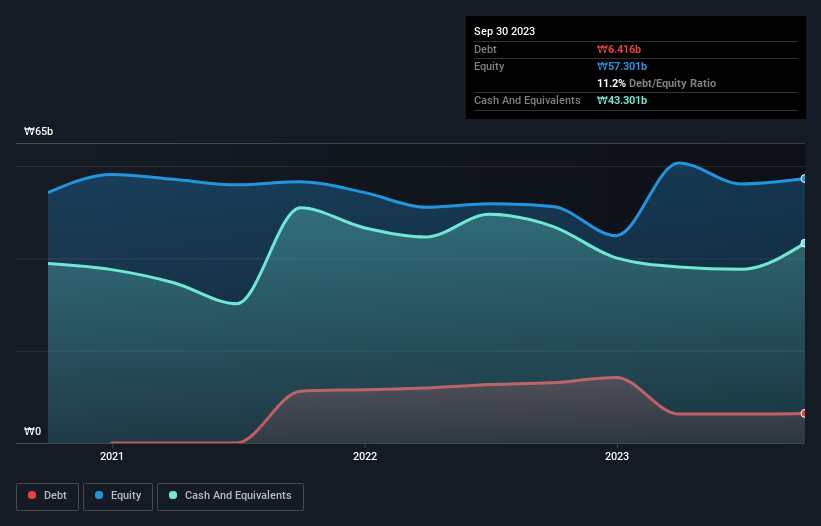The external fund manager backed by Berkshire Hathaway's Charlie Munger, Li Lu, makes no bones about it when he says 'The biggest investment risk is not the volatility of prices, but whether you will suffer a permanent loss of capital.' It's only natural to consider a company's balance sheet when you examine how risky it is, since debt is often involved when a business collapses. We note that Saltlux Inc. (KOSDAQ:304100) does have debt on its balance sheet. But is this debt a concern to shareholders?
Why Does Debt Bring Risk?
Generally speaking, debt only becomes a real problem when a company can't easily pay it off, either by raising capital or with its own cash flow. Ultimately, if the company can't fulfill its legal obligations to repay debt, shareholders could walk away with nothing. While that is not too common, we often do see indebted companies permanently diluting shareholders because lenders force them to raise capital at a distressed price. Of course, debt can be an important tool in businesses, particularly capital heavy businesses. When we think about a company's use of debt, we first look at cash and debt together.
Check out our latest analysis for Saltlux
What Is Saltlux's Debt?
The image below, which you can click on for greater detail, shows that Saltlux had debt of ₩6.42b at the end of September 2023, a reduction from ₩13.0b over a year. But it also has ₩43.3b in cash to offset that, meaning it has ₩36.9b net cash.

A Look At Saltlux's Liabilities
According to the last reported balance sheet, Saltlux had liabilities of ₩25.7b due within 12 months, and liabilities of ₩423.5m due beyond 12 months. Offsetting these obligations, it had cash of ₩43.3b as well as receivables valued at ₩2.26b due within 12 months. So it can boast ₩19.4b more liquid assets than total liabilities.
This short term liquidity is a sign that Saltlux could probably pay off its debt with ease, as its balance sheet is far from stretched. Succinctly put, Saltlux boasts net cash, so it's fair to say it does not have a heavy debt load! There's no doubt that we learn most about debt from the balance sheet. But it is Saltlux's earnings that will influence how the balance sheet holds up in the future. So when considering debt, it's definitely worth looking at the earnings trend. Click here for an interactive snapshot.
Over 12 months, Saltlux reported revenue of ₩28b, which is a gain of 8.4%, although it did not report any earnings before interest and tax. We usually like to see faster growth from unprofitable companies, but each to their own.
So How Risky Is Saltlux?
We have no doubt that loss making companies are, in general, riskier than profitable ones. And we do note that Saltlux had an earnings before interest and tax (EBIT) loss, over the last year. Indeed, in that time it burnt through ₩12b of cash and made a loss of ₩16b. While this does make the company a bit risky, it's important to remember it has net cash of ₩36.9b. That means it could keep spending at its current rate for more than two years. Even though its balance sheet seems sufficiently liquid, debt always makes us a little nervous if a company doesn't produce free cash flow regularly. The balance sheet is clearly the area to focus on when you are analysing debt. But ultimately, every company can contain risks that exist outside of the balance sheet. For instance, we've identified 2 warning signs for Saltlux that you should be aware of.
If you're interested in investing in businesses that can grow profits without the burden of debt, then check out this free list of growing businesses that have net cash on the balance sheet.
New: Manage All Your Stock Portfolios in One Place
We've created the ultimate portfolio companion for stock investors, and it's free.
• Connect an unlimited number of Portfolios and see your total in one currency
• Be alerted to new Warning Signs or Risks via email or mobile
• Track the Fair Value of your stocks
Have feedback on this article? Concerned about the content? Get in touch with us directly. Alternatively, email editorial-team (at) simplywallst.com.
This article by Simply Wall St is general in nature. We provide commentary based on historical data and analyst forecasts only using an unbiased methodology and our articles are not intended to be financial advice. It does not constitute a recommendation to buy or sell any stock, and does not take account of your objectives, or your financial situation. We aim to bring you long-term focused analysis driven by fundamental data. Note that our analysis may not factor in the latest price-sensitive company announcements or qualitative material. Simply Wall St has no position in any stocks mentioned.
About KOSDAQ:A304100
Saltlux
Operates as machine learning and natural language processing in South Korea.
Excellent balance sheet with minimal risk.
Market Insights
Community Narratives



